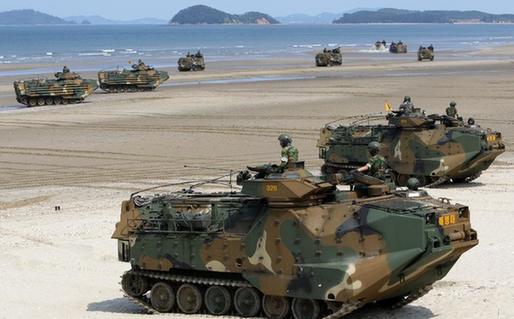Trilateral alliance counterproductive
- By Shen Dingli
 0 Comment(s)
0 Comment(s) Print
Print E-mail China Daily, June 28, 2012
E-mail China Daily, June 28, 2012
Regional multilateral mechanism would provide collective security and guarantee common development and prosperity
The United States, the Republic of Korea and Japan have just completed live-fire military exercises in and near the ROK. The US-ROK bilateral ground-based military exercises have been an annual event for years. The trilateral naval drill is also not new, as Japan has been an observer since 2008. However, this time Japan participated as a full partner.
|
|
|
South Korean marine corps take part in the Marine Corps-Navy joint military exercise at Anmyeondo beach in Chungcheong province of South Korea, June 25, 2012. [Xinhua] |
The purpose of these exercises is supposed to be "defensive" and for "humanitarian" purposes, yet they were plainly a display of military might that is intended to act as a deterrent.
But if the exercises were meant to deter aggression, they should have been more acceptable to other players in the region, as peace and stability in Northeast Asia are common goals for all countries in the region. The economic growth of all nations in this region needs a peaceful environment.
Such an excessive display of military muscle could be counterproductive. Due to its security dilemma, the Democratic People's Republic of Korea could seek to build up its strength to offset the perceived threat. That in turn could be viewed as a growing threat by the ROK, Japan and the US.
The result would be an endless arms race that would bring no additional security to all the relevant states and would be detrimental to the regional environment, stability and economic development.
Indeed there are ample concerns in the region. For instance, all countries are concerned about the sinking of the Cheonan, a ROK corvette, in March 2010. China and other UN Security Council members strongly condemned the attack. The artillery shelling of Yeonpyeong Island in November 2010 was even more alarming, and China called for calm and restraint.
Clearly, there is a need for restraint in the region. However, the excessive military might displayed in the exercises could be counterproductive. It is worth considering that the DPRK might have a strong feeling of insecurity.
The US blocked the former Soviet Union from deploying tactical nuclear weapons in Cuba. And just as the US felt insecure about having nuclear missiles on its doorstep, some states in Northeast Asia feel nervous about US nuclear missiles in their neighborhood. When the ROK is talking about bringing back US nuclear weapons, it is hard to convince the DPRK that nuclear weapons have no political value.
And when talking about the defensive nature of these military exercises, it is questionable to what extent the US alliances with Japan and ROK are purely defensive. Both Japan and the ROK have yet to legally commit to not assisting the US in any future contingencies and both sent their forces to Iraq, following the US invasion in 2003. Given the fact that this military action was unauthorized by the United Nations and the so-called evidence used to justify it was unsubstantiated, the alliances can hardly be viewed as purely defensive.
Therefore, the military exercises will obviously raise the apprehension of other states in the region, undermining the trust and stability that has been hard-won in Northeast Asia.
With tension in the region on the rise, it is imperative that stakeholders not grow wary of one another, but instead continue to engage in constructive ways to dispel mutual distrust and initiate cooperative threat reduction.
While bilateral or trilateral security groupings might demonstrate collective security resolve, it would be more far-sighted to forge a regional multilateral security institution that includes all states in Northeast Asia.
Under a regional security framework, an attack upon a member of the system would automatically constitute an attack against all other members of the system.
This would hopefully maximize the deterrence against any aggression by combining the strength of all states in the region, and allow maximum aid to any member under threat.
Such mutual non-aggression and assistance at the regional level offers Northeast Asia collective security and confidence, which could guarantee more trustworthy common development.
The author is a professor and director of the Center for American Studies at Fudan University in Shanghai.







Go to Forum >>0 Comment(s)